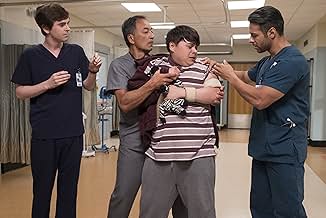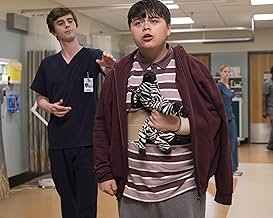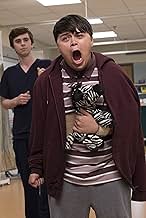Tough Titmouse
- Episode aired Oct 15, 2018
- TV-14
- 43m
IMDb RATING
8.0/10
1.6K
YOUR RATING
Shaun recalls his own past to help an intellectually disabled teenager, while Claire is put between an injured teenage rock climber and her worried parents. Meanwhile, Glassman's post-op hal... Read allShaun recalls his own past to help an intellectually disabled teenager, while Claire is put between an injured teenage rock climber and her worried parents. Meanwhile, Glassman's post-op hallucinations force him to confront a personal tragedy.Shaun recalls his own past to help an intellectually disabled teenager, while Claire is put between an injured teenage rock climber and her worried parents. Meanwhile, Glassman's post-op hallucinations force him to confront a personal tragedy.
Tamlyn Tomita
- Allegra Aoki
- (credit only)
Hill Harper
- Dr. Marcus Andrews
- (credit only)
Featured reviews
Like actually, what the hell. I hope whoever wrote this episode is never allowed medical control over another person. The rock-climber timeline is the most sadistic piece of television I have ever been unfortunate to witness. Whatever mind thought this up should go do horror instead. "We need another b-storyline, something with drama and some moral conundrum for our doctors... Ah right let us disable a young character for life so they might have children because that is what their parents want!".
I am honestly shocked both by how the episode choose to portray this, and seemingly wants us to be sympathetic to the parents. There is a slight moment where one of the doctors seem to realise what they have done, but no matter, because it doesn't matter. We have disabled a young person and there is no further consequence. There is nothing redeemable about this plotline. This might be a larger indication about the very nature of "Are autistic people people, and the they deserve basic respect"- the show, but it was more obvious with this one.
2/10- The doctors never learn and never face consequences for their actions.
I am honestly shocked both by how the episode choose to portray this, and seemingly wants us to be sympathetic to the parents. There is a slight moment where one of the doctors seem to realise what they have done, but no matter, because it doesn't matter. We have disabled a young person and there is no further consequence. There is nothing redeemable about this plotline. This might be a larger indication about the very nature of "Are autistic people people, and the they deserve basic respect"- the show, but it was more obvious with this one.
2/10- The doctors never learn and never face consequences for their actions.
Yeah, the mother with the special boy and the parents trying to preserve their child's lives were terrific stories. Also, dr. Glassman was neat as well. Great acting
The downside was at the begining with the feminist snark by the nurse about men being practical with whiny women. Now imagine if it were a man slipping some sexist remarks huh.. it'd be fun
The downside was at the begining with the feminist snark by the nurse about men being practical with whiny women. Now imagine if it were a man slipping some sexist remarks huh.. it'd be fun
I am giving this 10 for the awesome performance by Richard Schiff and the great drama. Although, only one thing that is weird. The timeline of the episode, I don't know or understand what is wrong with Shaun at the hospital and Shawn with lea at his apartment or the new apartment? Is he as fast as flash to get their and then back? Especially when he told Dr. Glassman that he kept the secret for 30 minutes. They must have missed something or I don't understand it.
In Episode 4 of The Good Doctor's second season, titled "Tough Titmouse," the series delves into the psychological scars that shape the characters' lives, both past and present. The episode begins with Dr. Aaron Glassman undergoing brain surgery to remove a tumor, an operation fraught with risk and uncertainty. Meanwhile, Dr. Shaun Murphy is confronted with painful memories from his childhood, triggered by a young patient who reminds him of his brother, Steve. As the doctors navigate these personal and professional challenges, the episode explores themes of trauma, resilience, and the enduring impact of past experiences.
"Tough Titmouse" is particularly effective in its exploration of the characters' inner lives, revealing the deep-seated fears and insecurities that drive them. Richard Schiff delivers a standout performance as Glassman, capturing the vulnerability and fear of a man facing his own mortality. Freddie Highmore is equally compelling as Shaun, whose flashbacks to his troubled childhood provide a poignant and heartbreaking insight into his character. The direction by Steven DePaul is sensitive and nuanced, using flashbacks and dream sequences to seamlessly weave together the past and present. The script by David Hoselton is rich with emotional depth, delving into the psychological complexities of the characters while also advancing the medical drama.
One of the most memorable aspects of "Tough Titmouse" is its portrayal of the enduring impact of trauma. The episode does an excellent job of showing how past experiences continue to shape the characters' lives, influencing their decisions and interactions in the present. The pacing is steady, allowing for moments of introspection and emotional resonance without sacrificing the urgency of the medical cases.
A particularly powerful scene occurs when Shaun, during a tense moment in surgery, has a flashback to a traumatic incident from his childhood. The scene is beautifully acted and directed, with the flashback serving as a poignant reminder of the pain and loss that Shaun carries with him. The use of lighting and sound in this scene is particularly effective, creating a sense of disorientation and emotional intensity that draws the viewer into Shaun's experience.
However, the episode is not without its shortcomings. The subplot involving Dr. Claire Browne's struggle to balance her personal and professional life feels somewhat underdeveloped, with limited screen time devoted to her storyline. Additionally, the episode's focus on Glassman and Shaun's psychological struggles leaves little room for the development of other characters, resulting in a somewhat lopsided narrative.
Despite these minor flaws, "Tough Titmouse" is a deeply affecting episode that offers a powerful exploration of trauma and resilience. The combination of strong performances, thoughtful direction, and a well-crafted script makes it a standout installment in the series, providing both emotional depth and compelling drama.
"Tough Titmouse" is particularly effective in its exploration of the characters' inner lives, revealing the deep-seated fears and insecurities that drive them. Richard Schiff delivers a standout performance as Glassman, capturing the vulnerability and fear of a man facing his own mortality. Freddie Highmore is equally compelling as Shaun, whose flashbacks to his troubled childhood provide a poignant and heartbreaking insight into his character. The direction by Steven DePaul is sensitive and nuanced, using flashbacks and dream sequences to seamlessly weave together the past and present. The script by David Hoselton is rich with emotional depth, delving into the psychological complexities of the characters while also advancing the medical drama.
One of the most memorable aspects of "Tough Titmouse" is its portrayal of the enduring impact of trauma. The episode does an excellent job of showing how past experiences continue to shape the characters' lives, influencing their decisions and interactions in the present. The pacing is steady, allowing for moments of introspection and emotional resonance without sacrificing the urgency of the medical cases.
A particularly powerful scene occurs when Shaun, during a tense moment in surgery, has a flashback to a traumatic incident from his childhood. The scene is beautifully acted and directed, with the flashback serving as a poignant reminder of the pain and loss that Shaun carries with him. The use of lighting and sound in this scene is particularly effective, creating a sense of disorientation and emotional intensity that draws the viewer into Shaun's experience.
However, the episode is not without its shortcomings. The subplot involving Dr. Claire Browne's struggle to balance her personal and professional life feels somewhat underdeveloped, with limited screen time devoted to her storyline. Additionally, the episode's focus on Glassman and Shaun's psychological struggles leaves little room for the development of other characters, resulting in a somewhat lopsided narrative.
Despite these minor flaws, "Tough Titmouse" is a deeply affecting episode that offers a powerful exploration of trauma and resilience. The combination of strong performances, thoughtful direction, and a well-crafted script makes it a standout installment in the series, providing both emotional depth and compelling drama.
Did you know
Details
Contribute to this page
Suggest an edit or add missing content


























